Fable
It's one of the most ambitious action role-players ever conceived, in which you literally live the life of a hero. But when we sat down with Fable for the first time, we wanted to make sure that the underlying game could back up that ambition.
Shop for games now with Simply Games.
Once upon a time there was a clever game developer. He was an eager man who always tried his best, and for this he was much loved by the people. Each time he made a game, he would pour his heart into its creation, hoping to push the boundaries of his profession. His lofty goals weren't always met, but he was admired for his ambition nonetheless.
Then, one day, the clever developer gathered the people together and told them of a new game he was making. It would be a role-playing game, he proclaimed, the greatest of its kind. The people were intrigued and, as the developer left to begin his long work, they braced themselves for the day when it would finally be in their hands...
Hero-worshipping
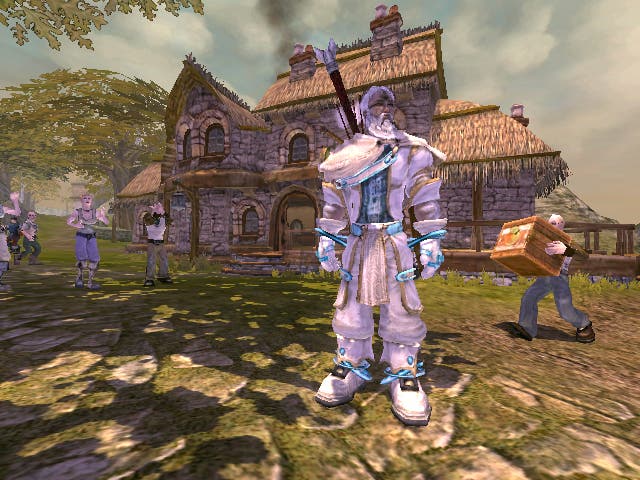
The ending to this story hasn't been written yet, but having spent some time with a near-complete version of Peter Molyneux's Fable, we can say that it's probably on course to be a happy one. But while the game formerly known as Project Ego is already a polished and impressive one, it's still hard to say if it will be the success that developer and Lionhead satellite studio Big Blue Box is aiming for.
Much has been made of Fable's two most touted features, the morality system and character evolution, and the overall thrust of your adventure - living the full life of a hero; swords, sprogs and your character's ageing and choices in life all taken into consideration. But, we reasoned, there's not much point implementing these clever ideas if the game itself doesn't handle convincingly. That is, after all, what led to a lot of people giving up on Black & White. With this in mind, we set out to answer a few of the questions we had about Fable the game - specifically, what would people make of the game's atmosphere, aesthetic, combat and controls.
The areas of the game that we saw in our quest were based mainly on the saved games of testers at a Microsoft software lab in Dublin. The good thing about this is that we got to see areas of Fable that a simple trade demo might not have given us access to, but the downside was that some of the characters were affected by cheats, which made the combat difficulty harder to judge. To begin with though, we started a new game.
Learning the ropes
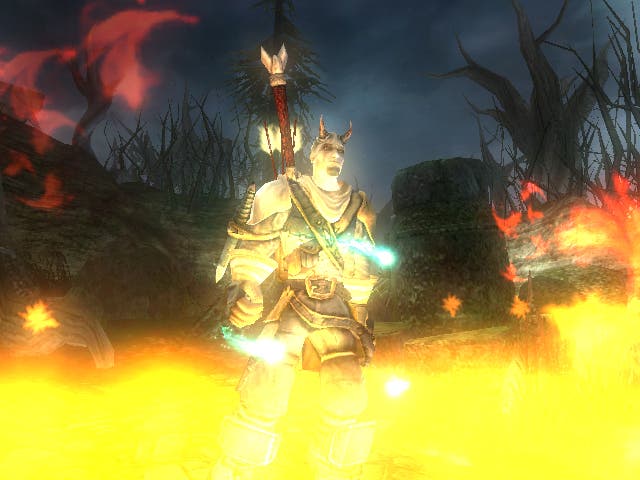
The first thing that strikes you about Fable - and it soon becomes clear just how important this aspect will be to the finished product - is the game's quirky complement of characters. Instead of the typical medieval-fantasy setting we were expecting, full of boring peasant types and monotonous accents, we found gaming's equivalent of Blackadder. Many of the NPCs will bring a smile to your face through voice and mannerisms alone. This might seem like a moot point, but once we saw how the game shaped up further on, it became a crucial factor.
For example, Fable begins with the first 'quest' given to your character (only a teenager to begin with) by his father. He wants you to buy a birthday present for your sister, but he also adds that he will give you a gold coin for "every good deed you do in the town". Now, in any other game, this would have been a bad start. Why would any father say that to his child? How would he know about the good deeds you performed, in any event? Fortunately, Fable doesn't take itself too seriously. While in any other game you might immediately find your suspension of disbelief, well, suspended, here we found ourselves unperturbed as we danced around Fable's whimsical, fairytale world.
A better example is the second quest we stumbled into. This time, a merchant asked us to stand between two crates of his and guard them, so that they wouldn't be damaged or stolen. After we agreed and he left, a young boy challenged us to destroy some of the crates in the name of reckless youth and pure evil (well, maybe not). Naturally, hitting stuff was more appealling than standing still, so we complied. All in the name of research, you understand. A few seconds later, the merchant came back, irate that we hadn't guarded his goods, and we received our first evil points.
The event itself was pretty boring, but the consequences were immediate. Once we arrived at the centre of the village, a guard (very 'Allo 'Allo) pulled us aside and said he suspected we had been up to no good, and that he was keeping his eye on us. And so he was. Having double-crossed a cheating husband a few minutes later, this bumbling PC Plod proceeded to give chase around town. And it didn't really matter to us that he somehow knew everything we'd done within a minute of us doing it - we were too busy chuckling at the comical sight of this jolly bobby darting around like something out of Benny Hill. Right from the outset, the emphasis seems to be on making the consequences of good-versus-evil dilemmas fun, rather than getting too bogged down in how people would really react to your actions. That's not to say Fable doesn't have a darker side to it - we found examples of that further on - but, from what we saw, it's more interested in keeping us entertained.
Technical knockout
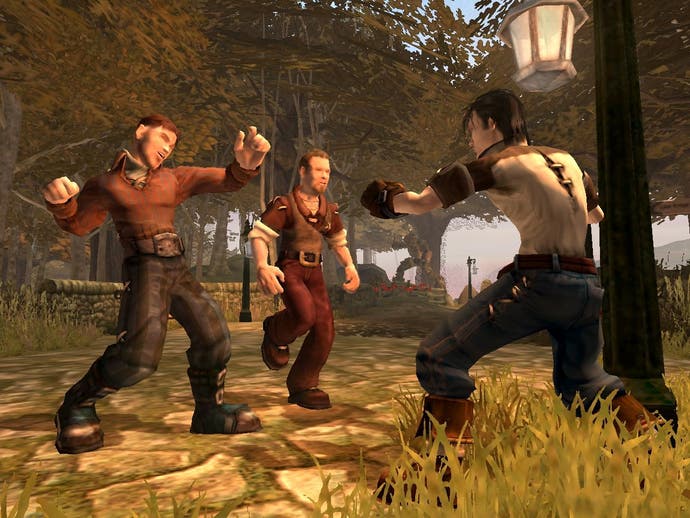
Graphically, Fable is actually a bit hit and miss. While it is technically excellent, we were a little underwhelmed by some elements. On the plus side, there's a lovely filter effect in use, which coats everything in a soft glow, the environments feel very organic, and the world is populated by well-animated NPCs, including the main character. On the down side, of the three or four villages and towns we visited, all seemed quite similar; there was a lack of bright colours in view and the building architecture was nothing to write home about - just enough to write here. Waterfalls and glimpses of far-off vistas were used to beautiful effect, but conversely we didn't come across any area of particular expanse. In fact, every area we visited was distinctly closed in - for an RPG at least - but hopefully there will be exceptions to this over the full course of the game.
In terms of navigation, however, there can be few complaints. The top right of the screen shows a little radar, on which there's a map of the surrounding area. Green spots seemed to indicate people you approach for quests, or interact with on that level, while there were also spots for exits and enemies. It could be argued that having a map that shows where to fetch quests is slightly RPG-lite (although perhaps you can turn it off), but equally it should make navigation easy enough for anybody who doesn't want to spend time searching for the next piece of action.
Camera control with the right stick, meanwhile, is responsive and not in the least bit annoying. Much like Sudeki, you can zoom in or out with it, and spin it left or right, but you can't look up or down. There didn't seem to be a first-person view and the tester talking to us confirmed its absence when we asked.
Village life
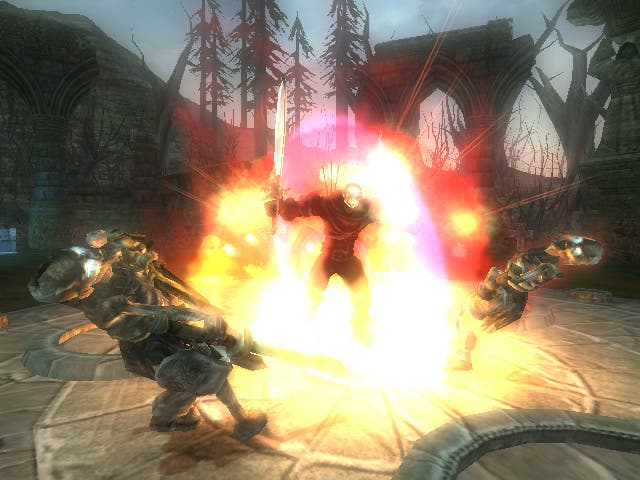
All in all, our impressions of the first village were very positive. The graphics were pretty, the Danny Elfman music was excellent, and the characters were instantly likeable. Far more encouraging, however, were the simple examples of consequence we saw - if every action we take in the full game earns responses like those of the 'bobby' guards then Fable's morality system will certainly have enough to separate it from that of KOTOR and other such games.
However, the time we spent with later areas of the game did place the experience in a slightly different light. Most of our concerns here lay with how NPCs react to your character - one of Fable's most interesting features. For example, in one of the saves we loaded up, our character (now an adult) was in a small, populated area, so we decided to see how much havoc we could wreak by killing people. For a start, it didn't seem possible to even hit most of the NPCs in the area, so Morrowind-style slaughtering of whole village might not be a possibilty in Fable. (Not that we ever did that anyway, honest.) What we did manage to do was convince a villager to follow us around - which is presumably only possible if you have sufficient hero status - and started hitting him instead. After the first hit, he muttered his disapproval, but once we continued he eventually started attacking us and we killed him. Straight away a stream of guards came our way, ordering us to pay a fine or face the consequences.
Naturally, we faced the consequences. Thankfully, our character seemed to be pretty strong and we were able to dispose of around 20 guards with relative ease, gaining more and more 'evil points' with every kill. The thing is, the NPCs that we couldn't attack reacted a little strangely to this mass murder; two old women were suitably defferent after the attack, speaking in fearful tones at their "master", but they both spoke the same lines and their body language said nothing of their fear. This was only a brief moment, though, and we legged it out of the village soon after, so it was hard to say if the whole place would have reacted so underwhelmingly. Once again, however, we'd have to point out that the overall whimsical nature of the world probably counteracts this kind of response; it's almost as if the NPCs expect such erractic behaviour from the 'hero/villain' class of society.
Sim Hero
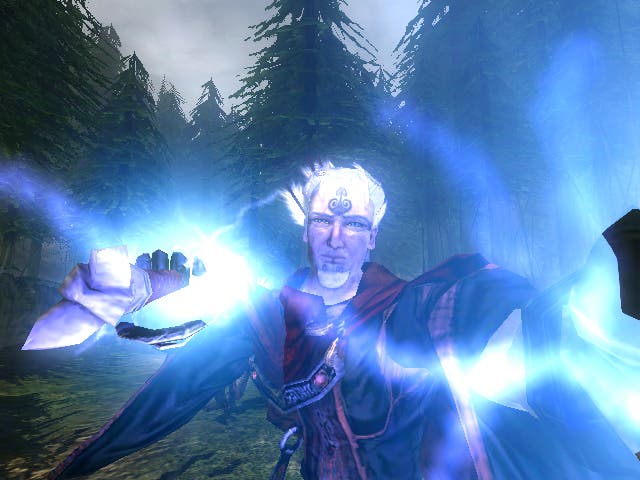
One thing that can't really be forgiven, however, is how many of the inconsequential NPCs seem to use the same models. In the case of the aforementioned old women, both were utterly identical, and we saw similar cases in other areas. Still, we really didn't see enough of the game to know if that was a recurring problem, and characters of more importance were far better realised.
Also worth mentioning are the comments townspeople throw your way when you've grown into an adventurer. One bizarre example was the term "chicken chaser", which was being fired at us from all directions in a place called Bowerstone City. We can only assume this related to an earlier quest, though we'd love to think it came as a result of constantly kicking chickens, which was something you could do in the first village. We'd imagine such comments are many and varied - and they add to your character's customisation wonderfully - though we'd also imagine they can get pretty tiring if repeated endlessly and by every NPC in a given area.
Other nice examples of NPC tomfoolery included being trailed by a hero-loving villager, only for him to mutter "I thought followin' an hero would be more exciting than this", and being referred to as "your highness" by another for some reason. Overall, we can't wait to see how our own character will end up being treated when we play the game through fully, which has to be a good sign. In fact, when you consider there's an ability to 'gesture' in the game (farting and waving being the two we remember), and earn new expressions, you even get the impression that Fable has been influenced by The Sims.
Will he, won't he
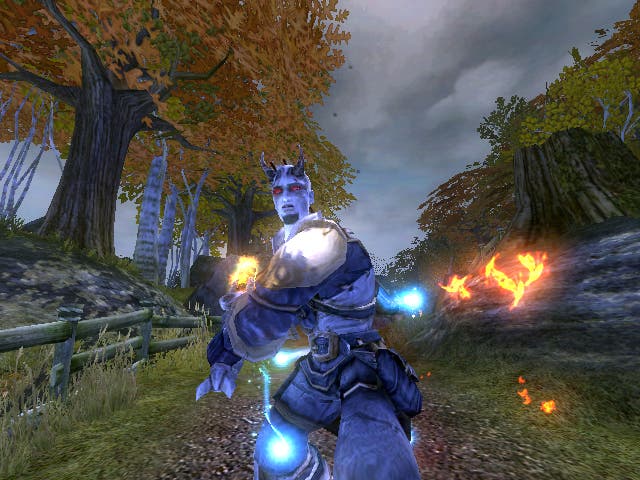
Of course, Fable is an action-RPG, and no matter how good the rest of the game might end up, it would all be ruined if the combat resembled a vacuum cleaner's obituary ("It sucked"). Thankfully, that doesn't seem to be the case here. At its heart, Fable is just another hack and slash affair, but through the 'Will' system Big Blue Box has made the experience sufficiently compelling.
Basically, combat boils down to one of three things in this game. First up is your basic melee combat. You can lock on to enemies, block, dodge and dish out damage. On its own, the melee combat feels slightly cumbersome - even frustrating when faced with multiple enemies at once - but the feeling of contact is quite pleasing, and even becomes addictive after a while, particularly thanks to the 'flourish' system, which multiplies experience earned depending on how many melee attacks you can string together in combination. So, while far from groundbreaking, melee combat is at least satisfying, and as your Strength and Speed improve over the course of the game - touched up in various sub-categories as you earn experience orbs, in a system slightly reminiscent of Sudeki's - you can expect it to become smoother and more varied, too. There's also archery to look forward to.
But where the fun really comes into play is with the magic system, or Will. We only got to see a few examples of this, but they included an ability that slowed down time (does any game not have that these days?), a Star Wars-style lightning attack, and a Berserk mode for increased power. Each of those complemented the melee side of things very well indeed, and there were a whole list of attacks to earn. In fact, it looks like you'd have to play as several different characters to access them all.
We spent most of our time fighting in an arena later in the game, where each round brought with it different enemies (the prize money was doubled for each round we completed without stopping for healing, etc) so we got to see a variety of them. There were slow-moving zombies, aggressive werewolf types, two huge rock trolls and an extremely large scorpion boss. None of them were particularly clever (in fact, some were a mite buggy) and in general they alternated between simple ranged and melee attacks. For the most part, like the majority of RPGs, it seemed less a case of how skillful you were at the combat, and more a case of battering away at enemies until one of you dropped dead. In saying that, we had a lot of fun in this area, and that's more than can be said for many action-only games we've played recently.
That's the end of that chapter
Overall, the time we had with Fable was very encouraging. Aside from the things we've already mentioned, a number of other things stuck in our mind - the 'Demon Doors' that offer difficult quests for high reward; the narrator's voice, which sounds like Alec Guinness, warning you when your health is low and the like; the special 'cards' that let you change your haircut at the barber; the collectable keys scattered over the game and the chests that will only open if you've found enough of them.
However, despite feeling relatively upbeat about it, there is still some serious doubt lingering over Fable in our minds. As much as we enjoyed our time with it, it's the sort of game - typical of Peter Molyneux really - that we can't really assess piecemeal. The early sections of the game are fairly on the rails before branching out and letting you make your mark on the world, but will the game's emphasis on giving you choices dilute the quality of the path you do take? Will your character evolve and change at a satisfying pace? Will your actions utterly change the course of the game, or only change the reactions of bystanders? Will we ever find out what "chicken chaser" means? With the game due out in a couple of months' time, we're reserving judgement until then - but here's hoping for a fairytale ending.
